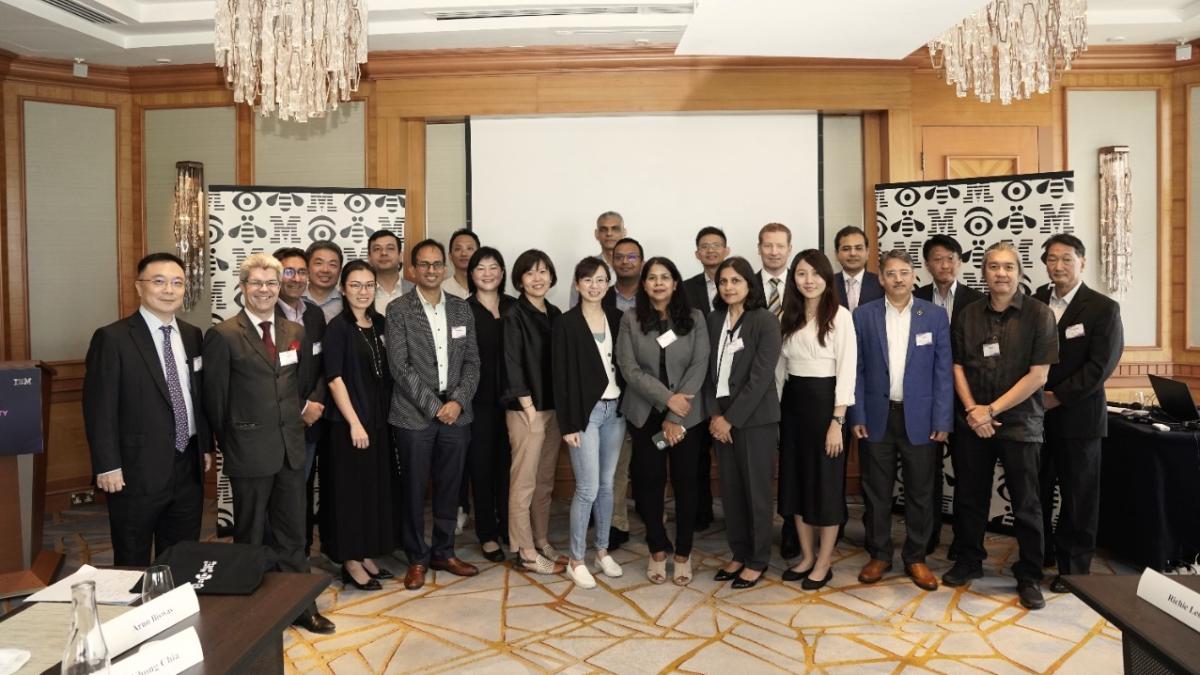
Singapore enterprises call out the lack of technology, skills, and data as the challenges for activating sustainability strategies
Other executives also added collaboration and lack of clarity around regulations to the list of challenges.
Big businesses have been touting sustainability in recent years. In a recent CEO survey conducted by the IBM Institute for Business Value, it was revealed that out of 3,000 CEOs surveyed around the world, 86% claim that their organisations have sustainability strategies in place. The same study revealed, however, that only 35% of the CEO respondents have started implementing their strategies. Meanwhile, 57% have identified that unclear ROI and economic benefits are leading obstacles in the effective execution of sustainability measures.
Those were amongst the general themes of the roundtable discussion titled ‘Walking the talk: Turning sustainability ambition into action.’ The event, held last on 6th December at the Four Seasons Hotel Singapore, was jointly organised by Singapore Business Review and IBM. Symon Hyett, managing editor of Singapore Business Review, moderated the event whilst Arun Biswas, Managing Partner, Strategic Sales & Sustainability Consulting, IBM Asia-Pacific kicked off the discussion with some industry insights.
The event had representation from senior executives from different sectors, including financial services, manufacturing, retail, and the public sector.
“The key issue is the gap between ambition and action,” Biswas said during his opening presentation. He added that other barriers hindering the progress of sustainability measures included insufficient insights from data to support decisions, the plethora of government and industry regulations that need to be complied with, lack of collaboration in both organisations’ internal and external networks, as well as the lack of technology and skills needed.
Sreepadaraj Karanam, Vice President of Sustainability and Corporate Social Responsibility at Bridgestone China and Asia Pacific, echoed these sentiments by noting that the two main challenges they face are cross-functional and cross-business communication, and the need to bring various departments together to transform the business and achieve ambitious carbon neutrality and circular economy targets. He went on to explain that this would necessitate the establishment of a seamless collaboration in R&D, production, manufacturing, sales, and the collection of products at the end of their life cycle.
Sustainability Programmes: Adoption Status and Challenges
Every organisation today is at a different level of maturity and adoption stage of defining Sustainability goals and implementing relevant actions. However, the challenges faced on the Sustainability journey are similar, some of these challenges and corresponding remedial measures were discussed at the round table.
Challenges:
Lack of communication and collaboration:
To address the lack of communication and collaboration, Bridgestone is promoting the establishment of shared objectives and key performance indicators (KPIs) across the different functions. Whilst all hands come together in pursuit of these shared goals, another challenge lies in developing a consistent understanding of the sustainability strategy and targets, as well as the lack of knowledge and competency amongst the departments. “There is no single sustainability training that can be simply offloaded, taken and applied to your department or your company, as it has to be adapted to your specific business needs,” Karanam said.
In response, Bridgestone developed a Sustainability Ambassadors program wherein employees develop their proficiency in sustainability through three levels of certification. Starting with the basic sustainability course, the program narrows to the R&D, production, procurement & supply chain, sales, and marketing teams which must be able to gain a deeper understanding of sustainability and communicate its concepts to customers and stakeholders. The third level of proficiency requires the employee to develop, complete and pass an independent project. “Creating these ambassadors was one of the biggest challenges across the functions so that these people can start taking ownership of their departments' responsibility towards sustainability,” said Karanam.
Need for Skills and Training:
Atos, a global leader in secure and decarbonised digital, is committed to achieve net-zero carbon emissions by 2039 at latest, and has initiated a pioneering and ambitious environmental programme more than a decade ago including development of skills, tools and knowledge to turn data into actionable insights. With the acquisition of EcoAct, an internationally recognised climate strategy consulting firm, the group has strengthened its decarbonsed digital solutions portfolio and expertise with highly specialised skills and capabilities.
Daniele Principato, CEO of Atos in APAC, explained that the company has investments in Europe’s Information Commissioner's Office (ICO), which runs carbon capture projects in Cambodia, Kenya, and India. Daniele emphasises the need to build a local Decarbonization Excellence Center with comprehensive delivery capabilities that help organisations in the region succeed in their climate ambitions and tackle their specific challenges in terms of sustainability.
Support and collaboration at an industry and country level: Even Singapore itself is not immune to the technical challenges of pushing its sustainability agenda forward. Zhi Hui Tang, Director for the Climate Change and Sustainability/Industry Division, Ministry of Trade and Industry revealed that “We want to be net zero by 2050, but it's not easy.” Whilst considered a wealthy nation, the country needs to cast a wider net of international collaboration and tap economies of scale to bring down the cost of its sustainability-related technology initiatives, dubbed “pathfinder projects.” At the moment, the government is looking into hydrogen-based solutions to clean up energy.
“We are committed to figuring out how to invest and collaborate with the industry to allow us to learn about hydrogen, plan far ahead, and see how we can leverage hydrogen to decarbonise our energy sector,” said Tang.
Adoption Status of Sustainability Programmes:
Organisations today are taking definite steps towards the adoption of sustainability initiatives. Here are some of the initiatives enterprises have adopted today, to progress on their sustainability ambitions:
Defining goals and KPIs: When asked about the state of their organisations’ sustainability programmes during the event, the attending executives revealed specific goals and existing programmes.
Bridgestone, for its part, has “committed ourselves to become a carbon neutral and circular economy business model by 2050,” said Karanam.
Creating a Sustainability-focused Committee/Team:
At Hitachi Asia Ltd, Dr Gerald Hane, Senior Executive for APAC, General Manager for Corporate Strategy, said that a board committee looks at sustainability advisory issues. We have sustainability experts embedded in the phenocrysts and a domestic partner. We also take a difficult position of prepping clients if they're not aligned with our values.” Hitachi aims to be carbon-neutral by 2030 in its factories, and in its process supply chain by 2050. In the same year, the company hopes to achieve a 50% improvement in the water.
DHL is targeting similar achievements: to have 100% of warehouses to be carbon neutral by the year 2025, and reduced carbon emissions to 29 million tonnes of CO2 for the whole DHL group by 2030. The ultimate goal is net zero by 2050, according to Amrita Khadilkar, Head of Environmental Sustainability, DHL Supply Chain Asia Pacific.
Leverage AI and Analytics tools and other technologies: On the other hand, Azendian Solutions, a data and analytics company, focuses on built environments to contribute to sustainability: commercial assets such as office buildings, shopping malls, hospitals, hotels, amongst others; and industrial assets such as water treatment plants and cogeneration plants.
The company, according to founder and Group Managing Director Bill Lee, leverages the use of AI to ensure equipment in these environments uses less energy whilst maintaining the expected output, enhancing productivity, extending equipment life, and expanding the scope and ability of the human operator.
Amit Garg, Head of APAC Pixel Supply Chain Planning & Operations at Google, reported that the supply chain team impacts the company’s sustainability the most, calling for the maximum change management of sustainability initiatives. He, however, admitted that the company might have reached a plateau in its sustainability progress at the moment.
Nevertheless, he explained that Google continues to live by its three-dimensional strategy which covers using more clean energy for its organisation, empowering others such as NGOs and other companies with digital tools and systems to help them achieve their goals, and empowering the common person with simple, yet sustainable solutions such as bike routes on Google Maps.
Daniele Principato, Atos APAC CEO, explains that IT and digital solutions – moving applications to the cloud, green data centers, to name but a few - have the potential to cut global carbon emissions by 20% by 2030.
“It's basically applying all of the portfolio capabilities that we have to drive that agenda. More importantly, we need to make sure that our customers understand the power they have in that digital transformation and help them drive it.”
In closing, Biswas reiterated the need for collaboration across industries and emphasised the need for a new paradigm of leadership, one that combines a range of capabilities including hyper-collaboration, change management, the ability to balance short and long-term perspectives with a purpose-driven approach and a commitment to address the needs of all stakeholders of an enterprise.
























 Advertise
Advertise








